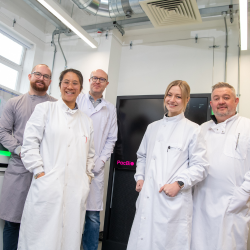-
Study
-
Undergraduate
- Search for a Course
- Undergraduate Open Day & Events
- Application Guides
- Northumbria University UCAS Exhibitions
- Foundation Years
- Undergraduate Fees & Funding
- School & College Outreach
- Continuing Professional Development
-
Postgraduate
- Postgraduate Study Degree
- Postgraduate Research Degrees
- Postgraduate Open Days and Events
- Postgraduate Fees & Funding
- Flexible Learning
- Thinking about a Masters?
- Continuing Professional Development
- Change Direction
-
Student Life
- The Hub - Student Blog
- Accommodation
- Life in Newcastle
- Support for Students
- Careers
- Information for Parents
- Students' Union
- Northumbria Sport
- Be Part of It
-
-
International
International
Northumbria’s global footprint touches every continent across the world, through our global partnerships across 17 institutions in 10 countries, to our 277,000 strong alumni community and 150 recruitment partners – we prepare our students for the challenges of tomorrow. Discover more about how to join Northumbria’s global family or our partnerships.
View our Global Footprint-
Applying to Northumbria
- European Union
- Our London Campus
- Northumbria Pathway
- International Events
- Entry Requirements and Country Representatives
- Regional Offices
-
Northumbria Language Centre
- Faculty Requirements
- Acceptable English Requirements
- Pre-sessional English Language and Study Skills
- Academic Language Skills Programmes (ALS)
-
International Fees, Funding & Scholarships
- International Undergraduate Fees
- International Undergraduate Funding
- International Masters Fees
- International Masters Funding
- International Postgraduate Research Fees
- International Postgraduate Research Funding
- International Money Matters
-
Life at Northumbria
- International student support
- Careers
-
International Mobility
- Current Northumbria Students
- Incoming Exchange Students
-
-
Business
Business
The world is changing faster than ever before. The future is there to be won by organisations who find ways to turn today's possibilities into tomorrows competitive edge. In a connected world, collaboration can be the key to success.
More on our Business Services -
Research
Research
Northumbria is a research-rich, business-focused, professional university with a global reputation for academic quality. We conduct ground-breaking research that is responsive to the science & technology, health & well being, economic and social and arts & cultural needs for the communities
Discover more about our Research -
About Us
-
About Northumbria
- Our Strategy
- Our Staff
- Place and Partnerships
- Student Profiles
- Alumni Profiles
- Leadership & Governance
- Academic Departments
- University Services
- History of Northumbria
- Contact us
- Online Shop
-
-
Alumni
Alumni
Northumbria University is renowned for the calibre of its business-ready graduates. Our alumni network has over 244,000 graduates based in 178 countries worldwide in a range of sectors, our alumni are making a real impact on the world.
Our Alumni - Work For Us
What will I learn on this module?
This module introduces an evidence-based approach to the relationship between diet, nutritional status and health in populations. You will learn fundamental principles in nutritional epidemiology and public health nutrition and key issues on the influence of lifestyle-related behaviours, policy and the wider environment on health and disease. You will acquire the scientific knowledge to ensure understanding of the impact of food and diet on health and well-being of people and communities, and ways to improve the diet, nutrition and health of people and communities. Factors which influence dietary intake and barriers which are encountered when recommending dietary change will be discussed.
You will learn about the application of methods of collecting, analysing and evaluating nutritional data with practical experience analysing dietary data using computer software as well as learning about the practice and theory of laboratory based methods to provide an understanding of their relationship with nutrition. Good working practice, the importance of professional standards and the application of professional conduct will also be covered.
The skills that you will gain in this module will include appraisal and synthesis of evidence, presentation, evaluation and interpretation of qualitative and quantitative data, independent learning, and problem solving.
How will I learn on this module?
Learning and teaching are via a range of approaches: lectures, tutorials, IT sessions, independent learning, and seminars led by academic staff, students and external lecturers with appropriate expertise on health-related dietary behaviours on health and disease.
The lectures will provide the knowledge required for you to understand the theoretical and practical aspects of the specialist subjects that will enable you to put into practice these concepts. You will also have the opportunity to attend tutorials to discuss module content and receive guidance on the assessments.
The module will help you to develop a range of knowledge skills which will enable you to be successful not just in employment but in life. You will develop a knowledge of research paradigms and methods of acquiring, analysing and interpreting data in nutrition.
How will I be supported academically on this module?
You will be supported in this module by the module tutor who will provide learning materials designed to develop your knowledge and raise questions. Directed independent study tasks will allow you to engage more widely with the subject matter.
In terms of wider university support, the library has a comprehensive portfolio of short courses, structured help, and leaflets to help you with issues such as, the English language, academic writing, basic mathematics, software programmes such as Microsoft Excel, statistics, critical thinking, laboratory report writing, and more general information such as “how to find a book or journal”, or “how to order an Inter-Library loan”. These can be accessed at the help desk in the library itself or online
http://nuweb2.northumbria.ac.uk/library/skillsplus/index.html
What will I be expected to read on this module?
All modules at Northumbria include a range of reading materials that students are expected to engage with. Online reading lists (provided after enrolment) give you access to your reading material for your modules. The Library works in partnership with your module tutors to ensure you have access to the material that you need.
What will I be expected to achieve?
Knowledge & Understanding:
1. You will be able to explain the impact of diet as a health-related behaviour on health and disease.
2. You will develop a knowledge of research paradigms and methods of acquiring, analysing and interpreting data in food science and nutrition.
Intellectual / Professional skills & abilities:
1. You will appreciate the methods available in nutritional epidemiology and public health nutrition.
2. 4. You evaluate and interpret qualitative and quantitative data, and be able to devise approaches to solving health problems.
Personal Values Attributes (Global / Cultural awareness, Ethics, Curiosity) (PVA):
1. You will learn independently, as well as in a group, to enhance your existing professional and personal skills and develop new ones to a high level, enabling you to sustain your own continued professional development.
How will I be assessed?
Formative assessment
1. You will complete a topic/theme choice form to module tutor for formative feedback
2. You will be asked to provide your allocated tutor with an outline of a draft topic as the focus of your summative assessment.
3. Feedback on a student’s initial choice of topic and literature will be provided to students from group tutors. (All MLOs)
Summative assessment
Component A of the assessment (50%) will comprise a Group Symposia on a chosen topic. The group task will be reported by individual oral presentations. Each presentation of the symposia will complement each other but also be self-contained. Each presentation will be 10 minutes long with extra 3 minutes for group conclusions. (MLOs 1, 2, 3, 4, 5)
Component B (50%) a written examination.
(MLOs assessed: 1,2,3,4,5)
Pre-requisite(s)
Knowledge of bioscience (including any of physiology, biochemistry, disease pathophysiology)
Co-requisite(s)
None
Module abstract
There is a growing demand for professionals with knowledge and understanding of research, policy and practice in nutrition to prevent and manage major public health problems in society. This module is designed to will identify and critically review key public health nutrition issues and explore the role of nutrition in the aetiology, prevention and management of disease across the lifespan.
In a competitive job market, gaining professional skills is key to a graduate securing employment. During the ‘Public Health Nutrition (Nutrition and lifestyle in health and Disease)’ module, you will be supported in developing effective professional practices through generic and specific employability skills such as personal responsibility and enterprise, self-reliance and self-direction, and for seeking out future employment opportunities.
Course info
Credits 20
Level of Study Postgraduate
Mode of Study 28 months Part Time
Department Social Work, Education and Community Wellbeing
Location Coach Lane Campus, Northumbria University
City Newcastle
Start September 2025
All information is accurate at the time of sharing.
Full time Courses are primarily delivered via on-campus face to face learning but could include elements of online learning. Most courses run as planned and as promoted on our website and via our marketing materials, but if there are any substantial changes (as determined by the Competition and Markets Authority) to a course or there is the potential that course may be withdrawn, we will notify all affected applicants as soon as possible with advice and guidance regarding their options. It is also important to be aware that optional modules listed on course pages may be subject to change depending on uptake numbers each year.
Contact time is subject to increase or decrease in line with possible restrictions imposed by the government or the University in the interest of maintaining the health and safety and wellbeing of students, staff, and visitors if this is deemed necessary in future.
Useful Links
Find out about our distinctive approach at
www.northumbria.ac.uk/exp
Admissions Terms and Conditions
northumbria.ac.uk/terms
Fees and Funding
northumbria.ac.uk/fees
Admissions Policy
northumbria.ac.uk/adpolicy
Admissions Complaints Policy
northumbria.ac.uk/complaints













